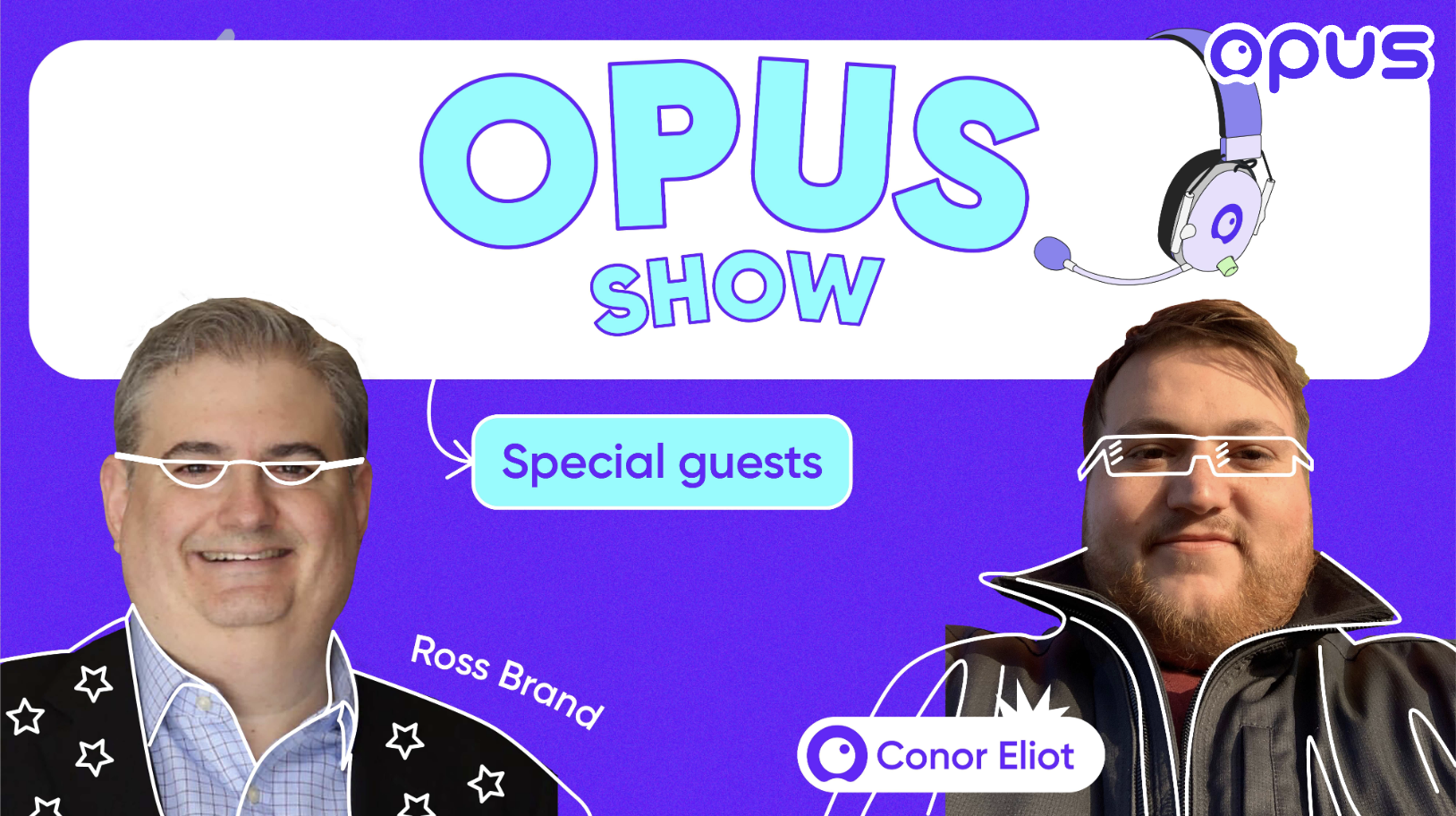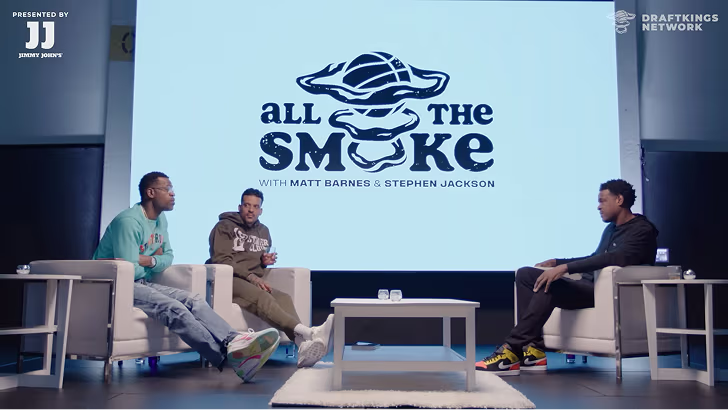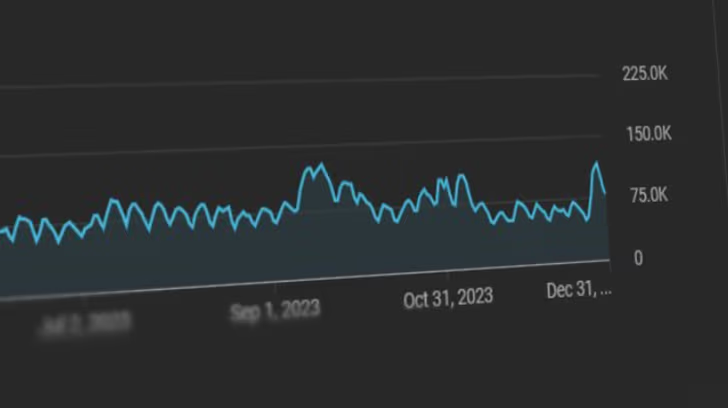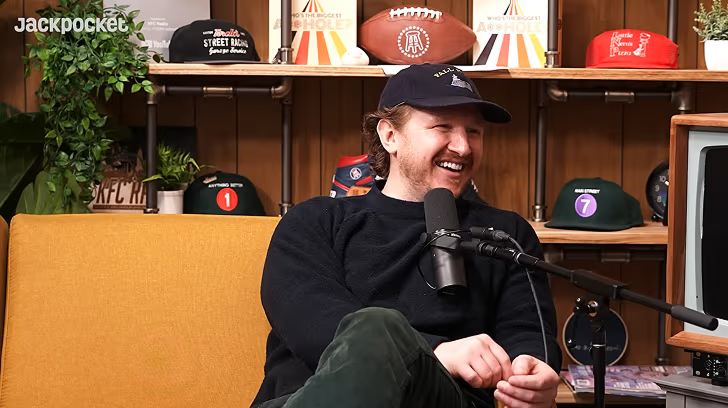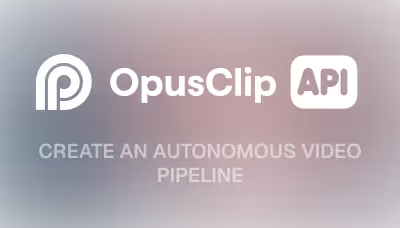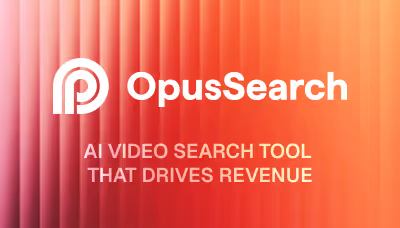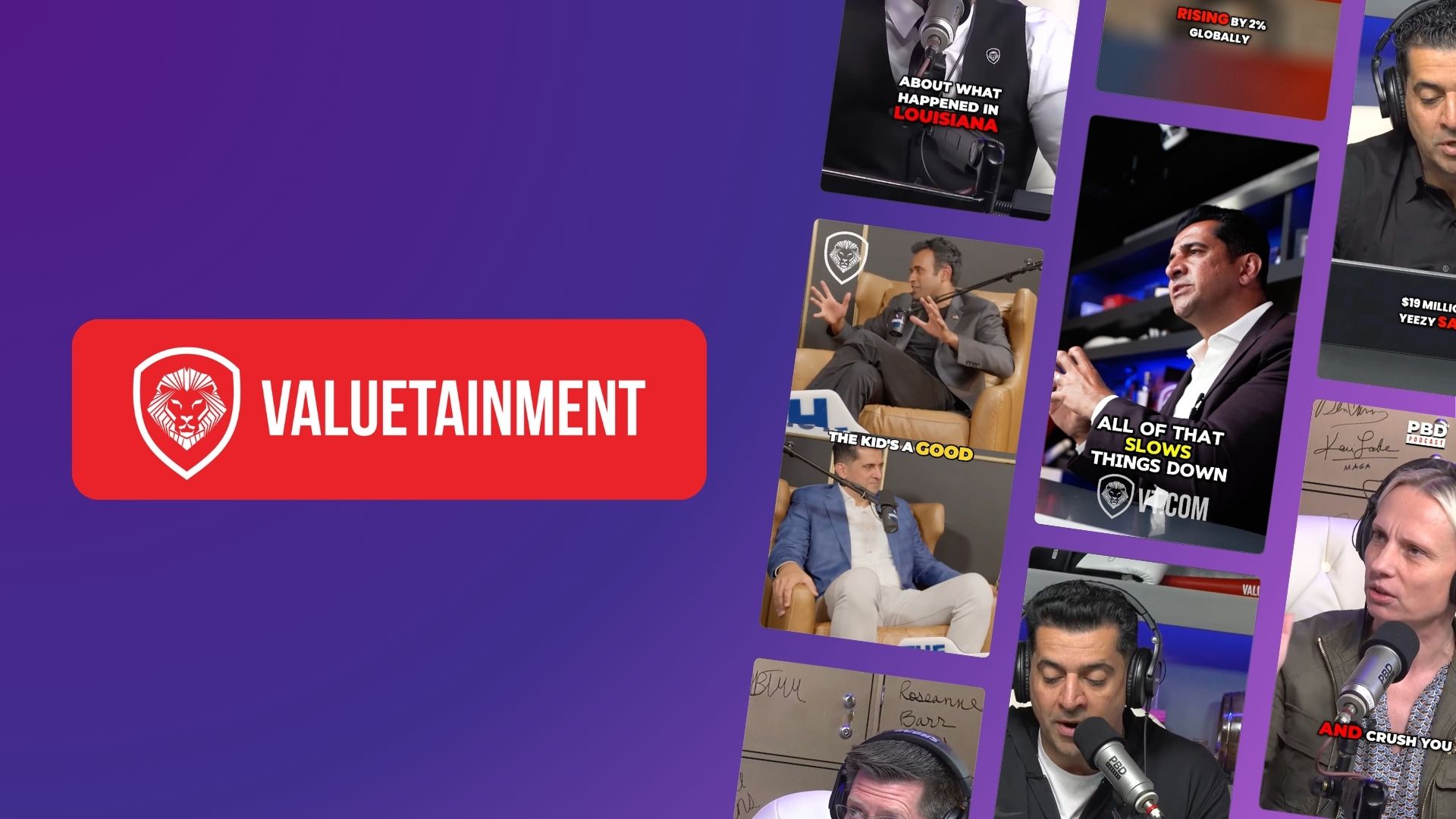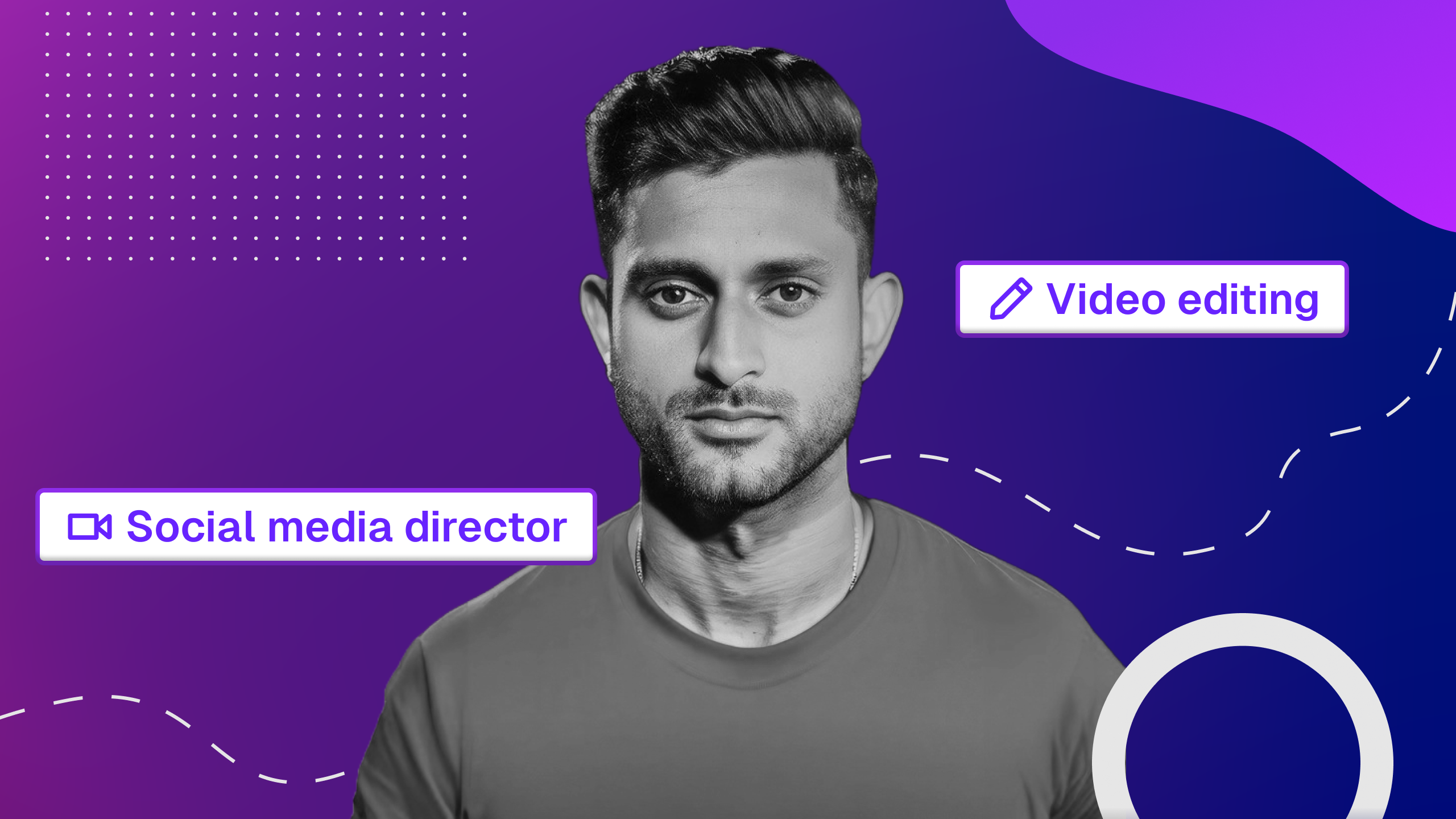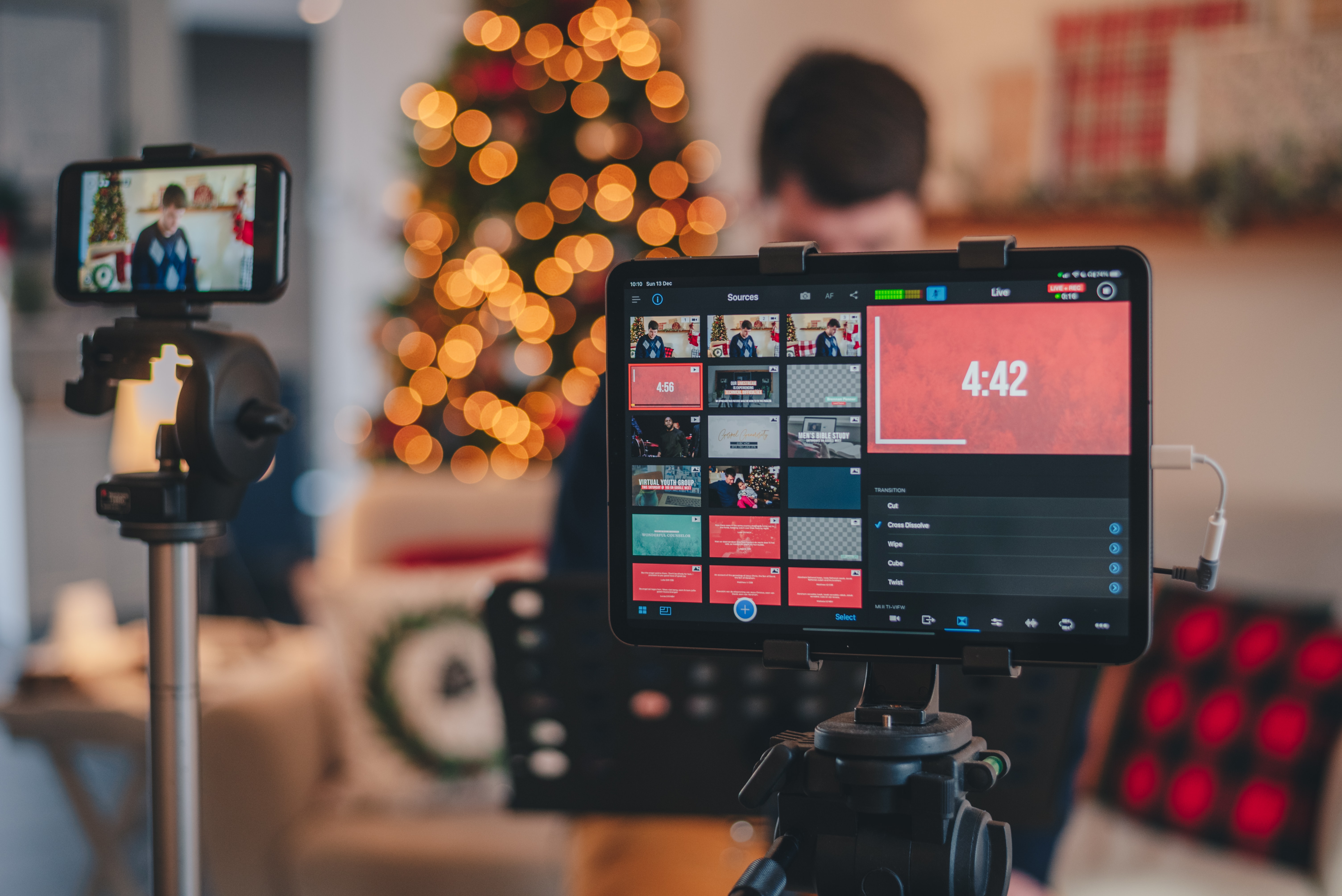📝Transcript
Conor: Hey, everybody, welcome to the Opus Show. I'm your host, Conor Eliot. It's great to have you guys here. We can't wait to have this discussion today, because I am joined by Ross Brand. He is an excellent stream coach, who's been around in the live production industry for a long time. And he has a lot of experience working with live streamers, and creators of all sizes and all backgrounds in building better livestreams. He also works with creators and broadcasting experts from all over the all over the place to build amazing insights about the Creator economy, about live streaming, and how to go live. He's taken all that knowledge and put it into two books that he's released in the last couple of years, called "Live Streaming and Digital Media Predictions," parts I & II. Both of his books are out now, and available on Amazon. I can't wait to talk to Ross today, so Ross, welcome to the show.
Ross: Thanks so much for having me. Conor, I'm excited to to join in to talk with you about everything to do with live streaming.
Conor: I can't wait to dive into it. But first, let's just warm up here a little bit. We've got some rapid fire questions that we want to go through, so let's get into it, no pressure! So first of all, can you please use three words that describe who you are?
Ross: Okay, assuming livestreaming is one word and not two. Let's go with it cuz some people write it as two, but let's go with "livestreaming video host."
Conor: Livestream video host, perfect! I like it. Alright, next, how would you describe what you do for a living to a five-year-old?
Ross: I talk to people on the internet through a camera and microphone.
Conor: Next, what would be your superpower if you had one and why?
Ross: I don't know if I have a superpower. I think I have a good knack for recognizing talent for livestreaming and podcasting, and what their niche might be in terms of the type of content they can create and monetize.
Conor: Perfect, awesome. Ok last question: If you had to delete all but three apps from your smartphones, which ones did you keep and why?
Ross: That is tough. Could you imagine having a smartphone with only three apps? I would say I would have to keep Spotify cuz I need music from time to time. It's not my most used app. But you can get podcasts and video on there as well. I would keep YouTube because again, if you want to watch livestreams and record video you've gotta have that. And of course Gmail, because you've got to have a way to communicate with people through email. So I guess with those three I could stay in business.
Conor: Sounds good. That makes sense. Alright, awesome. Thank you for running through those with me. So just jumping into it, I'd love to hear a little bit more from you about your background, how you got into livestreaming, and why you decided to start writing books and be a professional streaming coach.
Ross: So we'll do this one for adults, right? So for adults. Well, I worked in radio. I worked in radio for 12 years on-air as a host and an on-air personality. Then I left broadcasting, and figured that part of my life was done. It was a good experience, had some good times and had some tough times. But overall I was very much at peace with that and was going in a new direction, when I stumbled into a platform called blab. Blab it was for a short period of time a wonderful community of people hosting shows, hosting interview shows and talk shows, talking about business, and bringing other people on. It was a livestreaming platform with a community, a lot of discovery, and great content, so I fell in love with it instantly. I started livestreaming universe. And within I guess a month I started hosting a show called Live Stream Stars. I connected with a lot of people who were doing good things with livestreaming, and I've been doing it as a career and business ever since really, since maybe a couple of years after starting. I hosted shows for Be.Live, and then got involved with StreamYard when they were just getting started and hosted StreamYard Connect as they grew from, from really a small audience up into where they became a major player in the industry. I've worked with Live View. And of course, I do my own content. I also work with brands and creators on how to monetize livestreaming.
Conor: For sure, that makes sense. What about your books? How did you come up with the idea to write industry predictions?
Ross: Oh, wow. Okay, so when I first started live stream universe, I needed a way to kind of just make an impact, right? How can I make an impact? Okay, let's do predictions. Let's get 30-40 people together and have them submit predictions for what's going to happen in livestreaming next year. And that time was like, what's going on? This Facebook Live thing is coming? Is that a periscope killer, right? Think about how far we've come. So this year is going to be the eighth year and a few years back, I decided to make it into a book with the pandemic, it just seemed like, okay, this is no longer just for livestreamers and industry people. Everybody could benefit from hearing insights about how to livestream and what platforms maybe they should consider or not consider, and where technology and opportunities are going. So it just became a situation where like, yeah, let's get this to a wider group of people. There's a need for it. Because now since the pandemic, everybody's doing some form of live video. You're in zoom meetings for work, you're, you know, you're you're FaceTiming family across the country to see how they are down the block if you're, you know, quarentining. So it was just a time where I felt like, this wasn't just only of interest to industry people. Now this could be of interest to everybody, so I turned my insights into a book series! Part 3 is on the way.
Conor: I mean, we were so excited to talk to you today. Because, you know, I think it's so interesting to be able to talk to someone who's actually out there trying to make prognostications. I feel like the potential of livestreaming is limitless, and I think a lot of people see the potential in it, and how many people it can reach, not just for content creators themselves, but also for brands for businesses. Even everybody who has to do zoom meetings for work, like you said. There are limitless applications, but I think a lot of people are hesitant to say where it's going next. So we're really excited to talk to you and get some insight into the future of livestreaming, because, for those of you who don't know, Opus is a brand new Creative Live Stream studio. It's designed for people who are really creative, and want to do something different with their live show. We're approaching live content in a completely new way by focusing on the creativity, interactivity, and as well as the storytelling ability for everybody who goes live. And we're harnessing the newest advancements in technology that we've seen in recent years, especially AI, but also things like QR codes, being able to receive video reactions and comments that are dynamic from your audience in real time. And we're proud to announce that we've recently launched our working closed beta. We have a lot of crazy and experimental tools that we think content creators and brands and businesses, everybody out there who does live content will love. So we can't wait to show the world what we're all about and can't wait to talk to you about sort of what the future the creator economy holds. Thanks for joining us again, Ross.
Ross: Yeah, it's exciting. And I can't wait to see later on when we test out the video comment feature, you know, it takes things to the next level from, you know, reading somebody's comment in the chat. Now you are posting it on screen and actually being able to hear from your audience. Also, if you're recording a podcast, actually being able to have that audio and then have different voices within your podcast, it's exciting.
Conor: For sure! There's obviously the technological side of livestreaming, but then there's also the business and also a social side to it, right? So from that perspective, or I guess from all of those perspectives, where do you see live streaming going here in the next several years?
Ross: So without a doubt, in my mind, the future of live streaming is the merger of E commerce and live video. Live shopping, live, sell laying is going to become not just a nice to have, but it's going to become a business necessity. We saw during the pandemic, those business small businesses, corner stores, even, you know, local businesses that had the foot traffic to their store just completely shut down by the pandemic, and the lockdown. And those that were able to get on live video and talk about their products and show off their their storefront and and really bring people in and engage with them and create some content that was both entertaining, but also had a path back to their, to their store, their business, their products. It was a lifeline, it was a lifesaver for those businesses. And in some cases, they thrive like never before, because now they not only had the ability to reach people within walking and driving distance, but some of them acquired customers from all over the world. So I think as we get more of a distributed workforce, more people working remotely more people working, shopping online, people are used to going to online shopping platforms and buying that way. And the next step is to hear from people who are actually using the product and know the product and able to talk about products on those platforms, asking them questions in the chat, and having real time engagement. And I think, right now there's a few platforms doing it. But I think over time, you're gonna see a lot of businesses saying, hey, let's let's talk to the people where they are, they're online, this is a great way we don't even need a store. We don't even need a physical location or, you know, just a static website, we can really create content around the products that we want to sell and bring our audience in.
Conor: Awesome! Really insightful. I think, you know, I do think there's so many different applications, especially, like you mentioned with live, you know, live shopping, but also sort of on the corporate and business and write. You know, I think, you know, we saw a lot of more, you know, you know, whether it's conferences and panels or businesses choosing to do brand promotions, through the live format, right. You know, I think it would be really fascinating to sort of pick your mind and see, what do you think the long term impacts of this trend are? Do you see brands shifting more of their marketing budgets into live format? And how do you see brands really leveraging live streaming, not just as like a medium, but also as a technology to be able to connect with and consumers?
Ross: Yeah, I mean, as much as I love live, I don't think it's the answer to every business problem. So if, if you want to reach audiences with audio and video content, live streaming, first of all, is a great way to create that content that's authentic, it's real, it's in the moment. And even when people watch it on replay, or you repurpose it, there's a certain energy and just this dynamic sense about the content that you take from live streaming that sometimes isn't replicated in pre recorded content, where you're doing a lot of takes and different things. So if for instance, you're talking to a happy customer, who's telling you how much they liked your product, and kind of walking through that product journey, right? Like they, they needed a solution, they found the product, things are going great in their business, that all comes off really well when it's delivered live and unscripted. And so what I'm saying is, there's a value in life for content creation, you're not always going to get your biggest audience on the live stream. But there's a value in one take one half an hour of video conversation live leads to one half an hour of content. And then you can cut that up redistributed many different ways. You can get people to watch on the same platforms on the replay. You can upload it on demand, you can cut a clip out for YouTube that solves maybe one issue or answers one question. You can make reels and tiktoks and all sorts of videos from it and have a real Really an entire media strategy and not just the live streaming strategy that grows out of out of live streaming? So that's what I think people have to think of, there's no one answer or one way to reach people. I think, in the past, live streaming was working to some degree is destination viewing, like, hey, my shows every week at 5pm, or whatever, show up every Monday at 5pm. And I'll be talking about, does that work? It works for some people. But I don't know that that works for every business in every situation. So think about all the different places your audiences and how you can reach them with different things that can grow out of the live data, if that makes sense.
Conor: It does, but from that perspective, where do you see the biggest advantages in the live format, compared to, you know, say, a normal social media strategy? Or a content strategy?
Ross: Well, I mean, the biggest advantage in terms of, say, customer acquisition is, if I'm live, and a customer in the chat asks the question or says, I need a solution to this, or needs help with, you know, if you're a coach, or your consultant, and they need help, and you can show how you help people, whether it's that person, or it's somebody else, you're demonstrating your skill. Live, and in the moment, it's not, you didn't know what questions were going to come you didn't, you know, write a script out to put you in the best light, you're reacting, like, I'm answering your questions. In real time. I may know some of them ahead of time. But some times you're gonna you're gonna hit a hit something in your mind and go, Hey, I wanted to ask Ross this while we're on the topic, or he didn't answer what I thought he was going to answer. And and then people are able to see how I handle the questions about live streaming, how do I talk about live streaming? Do you get a sense of my experience with it? All that is, is an advantage of life, you're showing up for people, and you're talking to them, and they're able to interact with you through a live chat. And that's something unique, a unique strength of live streaming that podcasting and uploaded video, for the most part, television radio, that's a very much different thing, that real time feedback, you see your audience in the chat, you know, how they feel about what you're saying, you know, what questions they're asking, you're really sourcing the material in real time, and it's very powerful.
Conor: That's all fascinating. Yeah, there are so many elements to it. And I think that's where, you know, streaming coaches come in, and production coaches, because there are so many tricky elements to live streaming that can trip you up. But at the same time, the potential there is massive. So what do you think is holding back live streaming industry? For business or individual or content creators who are going live, what do you think are the big challenges that they're running into? And then what do you think is the biggest challenge that live streaming as a whole as a medium is running into?
Ross: I think the biggest challenge people face a lot of times is they have a preconceived notion of what their content should be before they've even tested it out. So it's great. If you've been like having having been in radio for 12 years, I had a pretty good idea of what I could do with live streaming, that would probably appeal to an audience. But when I first started in radio, I first was going to do music, then I realized my personality only so much fit to that, right my style, the way I deliver, okay, I don't seem like I'm a DJ dancing around the studio playing, you know, the hot tunes of the day. Right? So then I did an interview on a on a news topic. And I'm like, Well, you know, the talk thing seems more comfortable. And then the following week, I had somebody on to talk about picking the football games that were coming up that weekend. And once I did that, I could see how the audience, you know, the feedback, I got the just the general sense, like, Oh, he's got a sports delivery. So it might have been my third choice, but it was my natural where my natural style of talking and delivery and personality seemed to really fit well. And I ended up doing, you know, sports on air and radio for 12 years. So at the same time, I think the biggest problem is people go out and they buy a lot of gear and they develop a whole you know, they graphics and the whole nine for, for doing a certain type of show before they've actually gone live a few times, just with their phone on their personal Facebook profile or, you know, with with something like Opus and just talk to people for five minutes and get comfortable introducing themselves saying their name talking a little bit about what's going on in their life or what something they're passionate about, and getting off and then starting to feel when am I comfy, you know, do three or four or five of those? Where am I comfortable? Where am I not comfortable? You know, I knew I would be more comfortable sitting down in a sort of studio setup with a microphone and so forth, then I would be out and about walking holding the phone, because I had never even been on camera really when I did my first live stream. So it's all about like, where are you comfortable? Where you passionate? What do you enjoy? And also, how are you perceived by the audience and you don't know any of that until you really beta test that by going live in the beginning without a lot of expectation, find your place. And then you go okay, I'm now I'm ready to do some some business related content. And of course, business related content doesn't have to mean selling products directly. In the beginning, it can be talking about issues in your industry, answering questions that people have the questions you get all the time about, how do I do this? Or how do I do that. So there's a lot of different ways to connect with an audience. But you have to first kind of know yourself and know what you're good at and what you like and what people respond to. And the only way you find that out is by practicing a little bit in the beginning.
Conor: Absolutely, and I think there's no shortage of articles out there and just so much content out there that I think pushes creators in certain directions. If you want to get started as a content creator, and you want to learn how to do the live video format thing, you go to Google, you go to YouTube, you get out there and you try to figure out: what do I need to pay attention to? Pretty quickly you just get overwhelmed by information. There's so much info out there about what you should do. When do you go live? What camera do you need? What microphone you need, you know, all the studio setup "requirements". And like you said, people end up investing all the money before they even know if they're even comfortable on camera or not. Right?
Ross: Yeah, your first live stream is probably not going to be you know, if you've not done this before your first live stream probably is going to be not that great. Now you're sitting here with all this expensive gear and you go: I don't know if I'm any good at this. I don't know if I want to even do this, but I got $1,500 worth of gear here my god the pressure to like get at it. But imagine instead, you do it without any expensive gear and you go okay, it's a start that takes time. And then as your your content levels up, then you say what gear do I need to continue doing this and at the level that I'm now doing it if that makes sense. So you're you're hosting a show that's fairly professional. So after three years ago, let me get a professional broadcast mic I didn't start with as I started with a you know, USB mic plugged in, I started with the built in camera in my laptop. If the conversations good, people will tune in if the conversation is bad, you can have the best gear in the world. And people will leave right away. I think what happens is a lot of people who are giving advice on live streaming came to it through either social media marketing, or came to through tech. And while those are important elements of it, the tech getting less than and less so as platforms can do more and more for you without you having to do as much tech. Very few people came from broadcasting to this. And at the end of the day, it's still doing a show. It may be about marketing your business, it may require some tech setup. But if you have no feel for how to host the show and how to communicate to an audience, one to many on video, as well as listen and interact with a co host or a guest or a host there's a lot that that misses out it's still this is still the medium Right? Like when you take photographs, let's say of a disaster or something you're still framing it as like using How old would I take a good photograph right the the picture may be not the same as doing high art or doing it you know, a landscape or something But you're still using, you're still working in the mode of photography, even if you're working as a photo journalist, I guess that's probably the best comparison that I would say. So you have to think, not only as a marketer, not only as a tech person, not only as somebody who's building their brand, but you also have to think, as a broad, like, is this a show that somebody would watch? And What elements do I need in it? And am I taking enough time? Or am I taking too much time to get into my topic? And how do I bring people back and keep them engaged? And all these little things that a lot of people don't? Don't think about in the beginning?
Conor: Yeah, absolutely. I think there are so many little factors that all can contribute to it. But I do think that one of the things that I've seen, especially on YouTube and on Twitch is the platforms are set up in a way that as a viewer and as a user get driven towards creators that already have a lot of viewership, right? And then you see what they're doing, and you try to replicate their success. And next thing you go online, you read the do's and don'ts of live streaming, and you start to build a picture in your mind of what a proper livestream show should look like. I think one thing that we've seen on these platforms over time is that they're full of copycats. Everybody's trying to do exactly what everyone else is already doing, but if there's already established players in that space, so unless you are, you know, a brilliant orator or great live streamer, and can really master all these little details that you're talking about, it's hard to really find a market, gain viewership, and beat out the people that are already doing the same thing that are well established.
Ross: I think every, it's hard for everybody, I think, at this time, in the beginning, let's say there's a lifecycle of platforms, right? They stay ad live streaming as a feature they want it to do well, they send your stuff as wide as they can write everybody, the first time you go live on Facebook or LinkedIn, when it's a new platform for live streaming, they notify your whole network, right? And then as time goes on, and they realize live streaming isn't the thing that everybody's interested in, it's not new anymore. And you know, it kind of nag, nag you see on some of these platforms, they're hardly notifying anybody when you go live. So yes, good content and experience. And all that is, is certainly helpful. But you are, if you're streaming just to social media, you are at the whims of the algorithm. And it's not enough to just say, well, maybe your content isn't good, or whatever. Now you can look across the board, people who are great people who aren't good, and you're seeing everybody's reach, and audiences declined in the last several years on most of the platforms. There are exceptions, but that's the case. So then you have to think about, what am I what am I moving an audience too? Am I moving them to platforms where I can monetize? Am I moving them to content that's maybe behind the paywall, or that's exclusive or where I have some other way to engage with people and it could be using live video, but it could be using live video in you know, behind a login or in a membership group or in a course or so many other ways to use it for a virtual event. You have to think about all of these things. Because just going live at this day at this time may not be enough to gain what you want out of it. It's one aspect of a larger hole, a larger strategy, larger integrated, sort of media plan. Versus I'm just going to host the live stream show at this time, this date, and people are going to show up and there's nothing else I need to do that might have worked in 2017 on Facebook or 2019 on LinkedIn, but in 2022 Going into 2023 most of your big American platforms that we've you know, associated with social media, that doesn't work anymore. You have to promote it, you have to repurpose, you have to have other ways to communicate with people who show up for your show to keep them in the fold and keep them notified and engage with them. And you know, you have to have other ways to deliver your content, not just you know, Aaron clips to highlight but you may want to put it on a podcast platform and people who never watch a live stream may listen to every episode, as it's downloaded into their phone, or they may decide to watch you a video on demand that comes out of your, your live stream on YouTube, because they searched for how to livestream and they found our conversation. So there's just many different ways of of engaging people beyond simply just going live, because it's hard on these platforms right now.
Conor: Yeah, definitely, I think that the platforms definitely don't make it easy. You have the added challenge of, it's not impossible to enter the market compared to some other jobs you can do or skills you can develop. So, there's no shortage of people out there aspiring to be content creators. it's definitely harder than ever to stand out. But at the same time, I do think that there's also more opportunity than ever, just in terms of being able to harness live stream technology and be able to connect with people, sort of more on a person to person level, like you and I are doing right now.
Ross: Correct. And, you know, I think that that live for, has, has has evolved in that way a little bit, where we're seeing more genuine conversations happening and ever. And there's also measuring business success versus social media metrics and vanity metrics. So it's not necessarily about how many people watch your livestream, or how many hours of live view time you get, or things like that it's does this convert for your business to somebody join your email list that somebody buy a product to somebody schedule a potential consulting call with you, all those things are your real measures, if you're doing this on behalf of your business. If you're doing it on behalf of your brand, let's say you're job searching, you know, Did I did I connect with somebody who wants to interview me or referred me to, you know, a friend of theirs who's looking to hire somebody, there's so there's ways to measure success at this don't depend on the size of your audience. And in fact, if you're going to monetize off of these platforms, it's about taking your most engaged people who love what you do the most, who are most invested in laughing with you or learning from you. And often moving them to another opportunity where they have more access and more engagement, and exclusive content that they may be willing to support, whether it's supporting it through donations, whether it's supporting it through buying merch and other products, or joining a membership subscription type community. You have to think about, you know, I'm not going to get a million people and sell Pepsi and Coke as as sponsors, right. But I may get 20 really invested people who love what I do, and are willing to pay $50 a month for, you know, access to special meetups, you know, that are live and behind the paywall, and just for the core community. You know, so you have to think about that, like, where is the monetization strategy? What good the views and watch time and all that do for me if I don't have something else that I'm moving towards, and I don't have a way to distinguish between the masses of people who may or may not view for 30 seconds or a minute or 10 minutes, or even the whole show, and those who will follow me to a place where I can monetize and provide additional value.
Conor: All right, yeah, that makes sense. I think one thing we've seen is the evolution here in terms of different monetization models, right? I think you mentioned, you know, putting your content behind a paywall. A lot of content creators have switched to that, especially during the pandemic. You obviously have the classic model of getting subscriptions and bits and really just trying to constantly drive engagement and viewership. But we're also seeing a lot more applications now. Especially with live shopping on Amazon, and now TikTok are rolling out live shopping as well starting next year. You mentioned at the beginning that you see this as the future. Where do you see that in terms of prognostications of the future? what do you think the timeline is for creators to start shifting over towards that live selling model? Obviously there will always be creators that still work within the current existing monetization models. But do you see a shift overall in the industry towards that type of live selling monetization model?
Ross: Well, I think it's going to impact everybody. So whether your strategy is to get on and just directly sell products the whole time, here's, here's a mouse, you know, it gets you from one app to another in your computer. It's great, it doesn't break down, it's durable, it only needs one battery. Okay. So there's that kind of selling where the show is product after product. But it's also going to impact people who are talking about, I don't know, let's say we're doing a show on the influence of computers in modern business or something. So it's of interest to people who are interested in tackling computers, but it's not really about a specific product. Well, if the technology is there to put a product on the screen that somebody can buy, why wouldn't I put an image of this mouse up in the corner with my affiliate link baked in or a QR code and a picture of it. And let that be sort of like the sponsor, right, I'm saying you can still offer products related to what you're talking about whether you're actively selling those products, or more passively selling those products, there's also selling with your own call to action. So we talked about live streaming for the whole show. And then at the end, you say, if you want to try out Opus, here's a link to do so. The difference is, instead of me looking through the chat, and seeing where it is, and whatever, you put it right up on the screen, with a you know, an image that it just can't resist clicking on or, you know, that's where it's all going to where it's going to be so integrated. That doesn't mean that only people who do selling content are going to win. In fact, people may win, without actually always actively selling. But I think you have to learn the skill set now. So that you're ready for that era. Because ultimately, if you want to monetize this, you have to sell something. And now it's not necessarily get just get them on my email list, send them some things, and eventually, I'll have a program and I'll sell it to them through email. Now, it's, you're talking about what you're doing, but you bring up and also I have a program that starting in three weeks, and there's a link on the screen, if you'd like to learn more about it or, you know, you're ready to sign up. It's just going to be you're leaving money on the table, you're leaving your audience without having the best quickest way, quickest time to market to getting the product to them. It's gonna be ubiquitous. And I think it's, you know, I think you're gonna see Instagram Live, playing it up and having that capability. Pinterest, I'm sure is working in that direction. Somebody said they even announced live streaming coming to Pinterest the other day, I don't know if I've seen that. But I would think it's a no brainer on those two platforms, where there will eventually be a shop page and you go there and people are doing shopping live streamings where they're sharing their products and, and such. But you're also going to see it integrated into talk shows like we're doing here where, you know, you just click the button of the product that sponsoring it, or that's presenting the show producing it. And and in you go to, you know, sign up and start using it.
Conor: Absolutely. All right. Well, we only have a few minutes left. So let's hop over here to the video comments. Let's check this out, I think we received a couple of comments from some of your fans or former students. So let's watch this first one from Miko.
Miko: Hi, my question is when is the best time to livestream so that you can get an audience that actually comes and listens? Thank you.
Ross: That is a good question. Thank you Miko. Miko was featured in the last book and will be in the third book as well. I think the The time you go live should be the time that works best for you where your energy is going to be good where you're not pressured by, okay, I have to finish this one and start a presentation for my boss at 105. Well, you're not tired, and you're not tired of dragging yourself, but when you're going to be able to really be energetic and in the mood and articulate and enthusiastic and natural. So I think the time that works for you to be at your best, is most attractive to the audience. Because, again, it's not just about the live audience, it's about the people who watch on the replay. And the people who watch where you repurpose, and it's about your portfolio, your online portfolio, we talk a lot about selling. But there's also the idea, I think of live streaming sometimes as a portfolio doesn't necessarily matter at the moment how many people view it. But when someone gets recommended and says, Hey, Ross, you should work with this guy, Connor, he's great. What's the first thing I do? I google Conor, and what comes up his YouTube videos, or his, you know, his Twitter feed, and I go click there and watch at the top of the there's a video I click the video and I watch a little man, I go, Yeah, I like this guy. I like what he's got to say. I like his mannerism I like think he'd be fun to work with. And you got to think about that, that can be as impactful to your business as trying to sell widgets during a live stream. So don't forget, that's why I always tell people, whether there's one person watching or a million, you should always be doing the best you can do. You do what you do, and don't worry about the size of the audience. So that's my feeling, my feeling is you're not limited to any sort of time slot, do it when it works for you. And that's when you'll create the best content and connect with an audience. Obviously, if you're in the east coast of the United States, going live at two in the morning, probably isn't going to connect you with your audience. But whether you go live in the morning, the afternoon, the early middle of, you know, between six and nine o'clock at night or whatever, I'm not sure that that all makes a big difference.
Conor: Yeah, I think there I think there definitely can be like a small impact there in terms ofwhat type of content you're doing, whether it's news or commentary or just goofing around. People want to watch different types of content in general at different times in the day, but I agree. And in principle, I think for the average content creator, it really doesn't make too much of a difference.
Ross: I agree. I mean, I think if I were to do think about it strategically, I'd say leave 8 to 10 at night for the most part to the primetime TV networks. I think either you go early afternoon for for for talk and business content. Or maybe you go late afternoon for guests guessed focus, fun, more fun stuff. Maybe you do that. But you could do anything at any time. But I look at the early afternoon, late afternoon, late morning, East Coast is all being good, good times on weekdays. There's no real bedtime during the hours when people are awake and in front of a screen, which is pretty much every minute that we're awake these days. So, if we've got a phone in our hands or are sitting at a computer, we have access to live content.
Well, thank you so much for your time today, Ross. It was wonderful to talk to you. Everybody. Again, this is Ross Brand. He's got an amazing book series out on how to be a successful livestreamer. And we are so excited to have him here and work with him in the future, and with other creators like him to be able to make awesome live content. Again, I'm Conor from Opus, this is Ross Brand, and thanks for joining the show.
Ross: Thanks for having me, Conor.
Conor: No problem. Let's stay connected. Thanks everybody!
